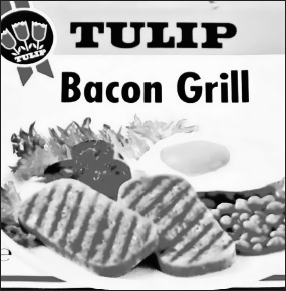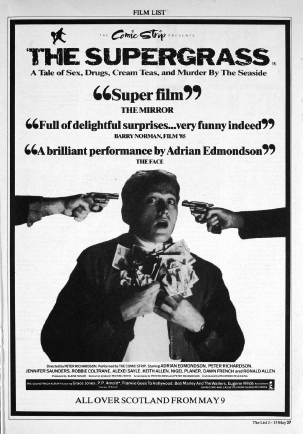The Comic Strip Presents . . .
The Comic Strip Club reaches its peak just as Channel 4, a new TV broadcaster, is created.
As a new channel they’re looking for new talent to make new shows ahead of their launch in late 1982. As ‘guerrillas of new wave humour’ who have recently offended Bianca Jagger, we fit this brief perfectly. However, at the same time, a producer from the BBC, Paul Jackson, gets wind of the fact that Channel 4 are signing up a lot of this ‘new talent’ and persuades the BBC to have a look at us as well.
We don’t choose between them – we go with both. We get two shows commissioned at the same time: The Young Ones on BBC2 and The Comic Strip Presents on Channel 4. Bingo.
While The Young Ones is two series of six, which take fourteen weeks to shoot, The Comic Strip Presents builds up to more than forty episodes, specials and feature films over the following thirty-odd years, and if Pete could get the funding would still be making things today. Pete still rings occasionally to say ‘I’ve got an idea for a film . . .’
The Young Ones is better remembered, it’s thought of as more ‘iconic’ or ‘groundbreaking’, but The Comic Strip Presents is more than just a series of programmes, it’s my spiritual home.
It’s where I make proper friends: Jennifer, Dawn, Pete, Nige and Robbie Coltrane. These are the people who become like my extended family, the people I go on holiday with, the people I trust, the people I love. Our children grow up together. In fact, just half an hour ago, Robbie’s daughter Alice dropped in with a jar of honey from her mother’s beehives in Ardnamurchan. (This is both true, and my attempt to get into Pseuds Corner in Private Eye.)
Pete Richardson is the de facto leader of the group. He’s also the most subversive.
A subversive leader?
Yes, that’s what makes it so complicated on occasion. He’s frankly incontinent when it comes to budgets. He either wilfully ignores them or sees them as something to be challenged. He always has a nervous laugh tugging at the corners of his mouth when he talks about money, as if he finds it hilarious. As if money itself is too bourgeois. It’s very funny to watch but it’s a bonkers way to run a business. There’s a time in the early nineties when the limited company we’re all part of is almost bankrupted by the lease on a photocopying machine. I’m laughing as I write this, both at the thought of a successful comedy group being brought down by a photocopier, and by the thought of Pete laughing about it. Watching Pete laugh is one of life’s joys – when he finds something funny he creases up, quite literally, and finds it difficult to speak for minutes on end. And when he finally gets his breath back he’ll repeat the first couple of words of whatever it was he found so funny and set himself off again. It’s infectious.
It’s not like we even do any photocopying. Who’s doing all the photocopying?
But Pete’s a disrupter – that’s his angle, that’s where all his comedy springs from, he likes to turn things upside down. He writes with another Pete – Pete Richens.
What?
I know, it’s confusing, but there are two of them, Pete Richardson and Pete Richens, a writing team known by all as Pete & Pete. To differentiate them, we sometimes call Pete Richardson ‘Mad Pete’. It’s an affectionate soubriquet but underlines his style and method.
Like me, Dawn and Jennifer are also ‘forces brats’ – their dads were both in the RAF. We discover that our three families all did a stint in Cyprus during the early sixties. It’s possible we may have met on the swings and roundabouts of a public playground. It’s a strange bond, but the three of us know the tedium of camp life; barbed wire fences and armed gates; houses that look like Nissen huts; parade grounds; and the only shop being the NAAFI – the armed forces version of a cut-price Lidl that sold everything from Spam to . . . Spam.

For a special treat Mum will buy a can of Bacon Grill
Dawn is the only one of us who gives up a proper job to risk it all on a six-part comedy series. She’s a successful and much-loved teacher when Channel 4 commission us – I still get approached by people who say, ‘Dawn was my teacher, she was brilliant.’ It’s easy in hindsight to think, ‘Well, The Comic Strip Presents was obviously going to be successful,’ but we’re living hand-to-mouth at the time and there’re no obvious signs of longevity. It’s piecework. There’s no security. It’s a punt. The rest of us are either a) too blinded by the love of our art form, or b) too feckless, to get a real job.
This raises the stakes for Dawn personally, and perhaps because of that she becomes the mother of the group – always keen for things to be properly organized, to make the best of the opportunity. She also becomes the kind of moral conscience of the group. In fact you could say she’s sometimes rather serious . . . but this is constantly undercut by her ridiculous clowning ability. She has a clown-like face – I mean this in the most complimentary way – in that her facial expressions always amplify exactly what she’s thinking, and it’s just FUNNY. Some people are just FUNNY.
When I first meet Jennifer it’s hard to know whether she’s too in love with her art form, too feckless, or just doesn’t care. She’s perhaps the most punk amongst us. Like the way Johnny Rotten sings ‘and we don’t care’ at the end of the chorus in ‘Pretty Vacant’ – Jennifer appears to not care about anything. Except bands – The Tourists, Robert Palmer, Blondie, Elvis Costello – and gin and tonic, and having a good time, and making Dawn laugh. This appears to be the constant in double acts – the desire to make the other one laugh.
Jennifer lives with her old college friend Jobo and it appears the two of them would quite happily do nothing and live off cat food for the rest of their lives rather than do something that wasn’t ‘fun’. She has a vicious mimic’s skill – she can instantly distil an attitude she’s spotted and turn it into a line, a scene, or a character . . . or indeed a series.
Nigel is the one with the biggest acting CV when we start. He’s already had a couple of bit parts on the telly and has understudied Che Guevara in Evita in the West End – this makes him a big cheese. He’s also the only one who’s been on a proper acting course at a proper drama school and learned proper ‘acting’. This makes him an even bigger cheese. Though as his later hilarious spoof character Nicholas Craig demonstrates in his book I, An Actor, he’s able to take the piss out of it. Sort of vegetarian cheese.
The double act between Pete and Nige is the least harmonious of the three double acts. I never get to understand the nitty-gritty but during a year at the Comic Strip Club they’re always having arguments in the corridor. I think it’s probably about levels of performance and what the other is doing on stage. They come from two different styles: Pete would like to be Lee Van Cleef or Clint Eastwood – a kind of close radio-mic type of performer; while Nigel has a great singing range and is more theatrically aware.
The Pete and Nige double act comes to an end once we start making TV programmes. Pete starts writing with Pete. But I end up having a longer working relationship with Nigel than with anyone else in the group. We’re still working together now. Over the last few years we’ve written a couple of plays together. I love sitting in my study with him, chewing the fat, bitching, writing, and laughing.
Robbie is the oldest in the group. He’s been to the Glasgow School of Art and he’s come to acting in his mid-twenties. He’s done theatre shows in Scotland and is biting at the edges of film work when we come across him – who can forget his ‘Man at Airfield’ in Flash Gordon (look harder next time). He’s an intimidating giant of a man, hence his future casting as Hagrid, but underneath he’s delightfully playful. He has such a beautiful childish face when he finds something funny. His eyes literally twinkle.

I’m following him down to Devon one day to shoot The Supergrass – a tale of sex, drugs, cream teas, and murder by the seaside. Robbie’s driving one of his beloved Cadillacs, when it starts to rain. I see him switch his wipers on and they promptly fly off and over the back of his car. I can’t help but run them over. It sort of sums Robbie up – a big, stylish hulk of a man with an eye for the surprisingly idiotic.
So here we are, a group of inexperienced filmmakers, suddenly making films. The Comic Strip Presents is all on film – it’s a very different proposition to shouting at an audience in a darkened theatre. Do we feel daunted? NO – we bloody don’t. We’ve all seen a film – how difficult can it be?